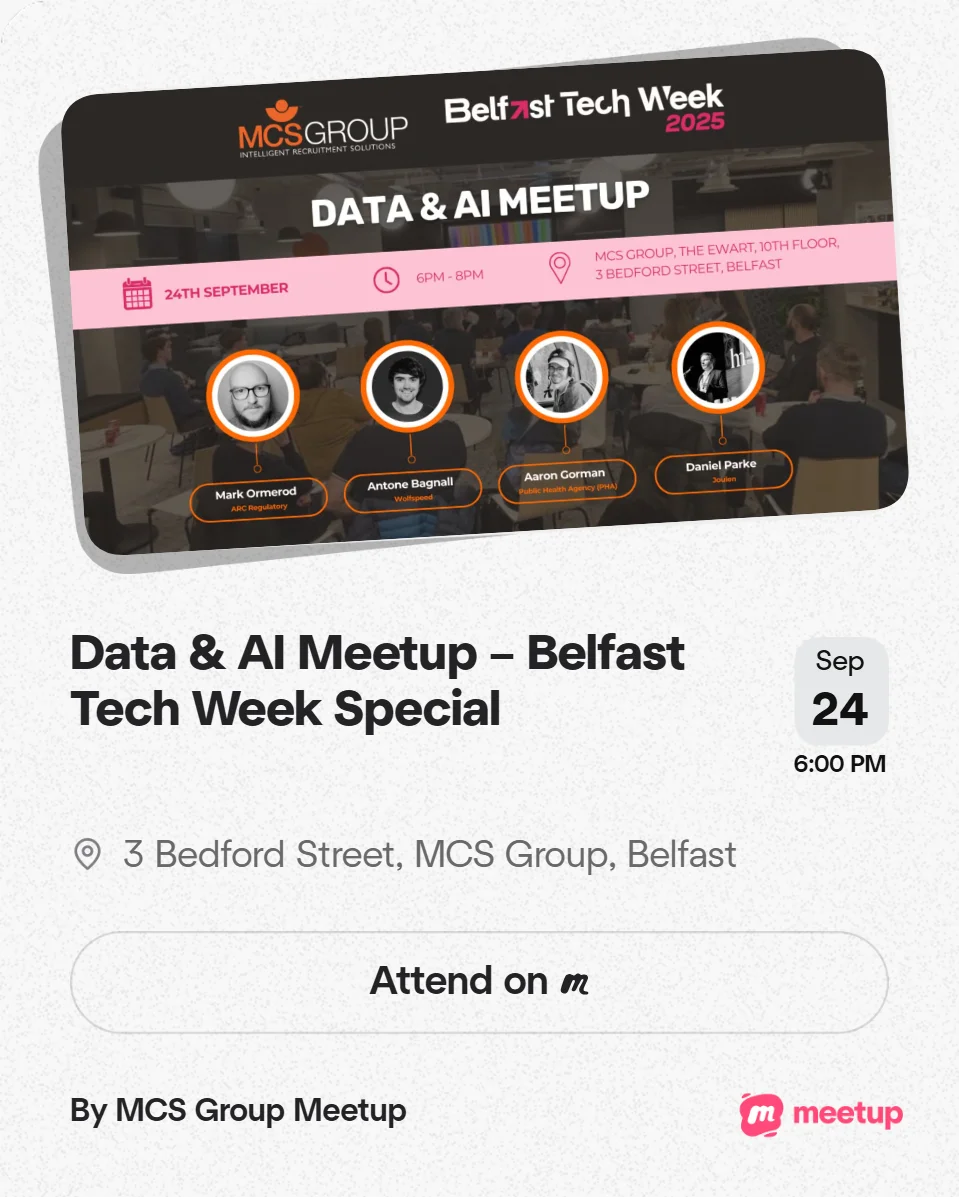
Why 2025 is Becoming a Defining Year for Contract Engineering
17 Jun, 202510 Minutes
Following years of disrupted supply chains, 2025 is already seeing a sharp rise in project-based work and delivery-heavy engineering pipelines. Teams are working under tighter timelines, with evolving regulations, economic caution, and renewed investment in digital acceleration driving faster, more complex delivery.
From automation upgrades to offshore wind installations, the pace of engineering work is increasing. This is especially true in Northern Ireland, where demand for specialist skills continues to outstrip supply, as highlighted in our latest Employment Monitor.
With permanent headcount under pressure, more companies are turning to contractors to keep work moving. Contract engineers bring the specific skills needed to solve delivery problems fast, without cutting corners.
This blog outlines the five most in-demand contract engineering skillsets for 2025, what’s driving demand, and how to recruit with speed and confidence.
1. Embedded Software Engineering
Embedded software continues to top the list of in-demand contract engineering skills, with strong year-on-year growth in contractor demand across manufacturing and MedTech sectors in Northern Ireland.
From IoT-enabled devices and autonomous vehicles to consumer electronics and MedTech applications, the need for engineers who can bridge hardware and software is only increasing. Many engineering projects now rely on deeply integrated embedded systems to deliver core functionality. As embedded systems power more functionality, there’s a clear rising demand for engineers who can move confidently from low-level C/C++ coding to implementing RTOS frameworks, especially in high-integrity environments like MedTech and defence.
Contract engineers often support projects when in-house capacity is stretched or when niche expertise is needed to keep timelines on track
Common use cases include:
- MedTech scale-ups building secure firmware for wireless medical devices
- Manufacturing teams retrofitting legacy equipment with smart sensors
- Consumer tech firms under pressure to reduce time-to-market
- Defence contractors developing embedded control systems for mission-critical equipment
- Automotive suppliers racing to integrate advanced driver-assistance features
Key tools and skills and demand include:
- C, C++, RTOS, firmware development
- Hardware integration and debugging
- Industry-specific protocols (e.g. CAN, I2C, SPI)
Hiring managers should prioritise candidates who have delivered in ISO 13485 or DO-178C compliant settings, where quality assurance and traceability are essential from day one.
In contract roles, delivery-readiness is critical. Ensure contractors can demonstrate project outcomes, not just credentials. Many companies are turning to software engineering contractors who’ve successfully delivered on embedded safety standards, accelerated firmware projects, or optimised performance-critical systems under tight delivery schedules.
Hiring in embedded software often spans both digital and technical disciplines, with relevant opportunities typically found across our IT & Digital and Technical & Engineering sectors.
2. Industrial Software – PLC & Control Systems Engineering
Automation is completely changing how things operate across manufacturing, life sciences, and industrial operations, and it’s driving sustained demand for PLC and control systems engineers. These specialists keep essential systems running efficiently and safely, often stepping in to troubleshoot or deliver urgent upgrade installations that keep operations on track and within regulatory standards.
What sets them apart in a contract setting is their ability to quickly integrate into legacy environments or support new installations without disrupting production.
In sectors where every hour of downtime can result in significant losses, this adaptability becomes non-negotiable. Many of these engineers also bring deep familiarity with site-specific compliance requirements, ensuring new systems are both functional and audit-ready.
Control systems contractors are often hired to:
- Optimise existing automation lines using Siemens or Allen Bradley platforms
- Support emergency maintenance or systems recovery during production faults
- Oversee commissioning of new SCADA systems in greenfield or expansion projects
- Retrofit outdated PLCs to meet new regulatory or productivity benchmarks
- Provide short-term cover for permanent staff during peak operational periods
Minimising downtime and maintaining precise documentation standards are priorities for many facilities managers. On production lines, hiring through contract recruitment channels is a strategic move that brings immediate value without long onboarding timelines.
Key tools and technologies include:
- Siemens S7, Allen Bradley, Omron PLCs
- HMI/SCADA systems (e.g. WinCC, Wonderware)
- Industrial network protocols (Profibus, Modbus, Ethernet/IP)
- Diagnostic and simulation software for remote testing and deployment
In technical recruitment, it's often the contractors who bring both domain depth and deployment speed. The ability to deliver fast, site-ready solutions with minimal guidance is exactly what makes this talent pool so valuable. Not only do they provide essential expertise, but they also often play a central role in delivering project success.
3. Data Engineering
As software delivery becomes more data-driven, the demand for data engineers and infrastructure specialists has grown sharply. These professionals are the architects of modern analytics environments, structuring, integrating, and optimising data pipelines so teams can trust the insights that inform their decisions.
Contract data engineers are especially valuable when organisations need to build or modernise their cloud infrastructure or scale storage and processing capacity. They’re often brought in to accelerate delivery, ensure compliance with data governance standards, and help software developers work more efficiently.
We regularly see contract specialists engaged to:
- Migrate data workloads from on-prem to cloud platforms (e.g. AWS, Azure)
- Build secure, scalable data pipelines for product or analytics teams
- Introduce observability and monitoring into software delivery infrastructure
- Support software engineering teams with high-volume, low-latency data access
Technologies frequently required include:
SQL, Python, Spark, DBT, Kafka
Cloud architecture (AWS, Azure, GCP)
DataOps and CI/CD tools (e.g. Terraform, GitLab, Airflow)
Contractors for software delivery in this space are often as crucial as the developers themselves. When it comes to technical recruitment in 2025, those who can lay the foundations for agile, compliant data workflows are among the most sought-after specialists in the market.

4. DevOps, Cloud & Infrastructure Engineering
With businesses under pressure to deliver software faster and more reliably, DevOps engineers and cloud automation contractors are instrumental in keeping systems resilient and secure while scaling efficiently.
Contract DevOps professionals are typically brought in to support:
- Stabilising and optimising CI/CD pipelines under time pressure
- Building and maintaining infrastructure-as-code environments
- Introducing observability and monitoring into manual or legacy systems
- Aligning cloud infrastructure to compliance and security requirements
- Enhancing deployment reliability across hybrid and distributed teams
Key tools and technologies in demand include:
- Cloud platforms: AWS or Azure
- Automation and orchestration: Terraform, Kubernetes, GitLab
- Monitoring and alerting: Prometheus, Grafana, Datadog
DevOps contractors manage infrastructure, enhance deployment workflows, and help reduce recovery times to boost deployment confidence across the board. This has become especially valuable for companies managing hybrid infrastructure or operating across distributed teams.
Hiring DevOps engineers on a contract basis allows organisations to solve urgent infrastructure challenges without diverting internal resources.
When the delivery timeline is tight and failure isn't an option, they’re brought in to stabilise CI/CD pipelines. By removing blockers and creating reliable, automated systems, they enable software developers to focus on innovation and delivery. DevOps has become a central part of how modern engineering teams operate.
Contract software developers increasingly expect to work alongside automation engineers who can maintain stable, scalable infrastructure. And, as more businesses embrace cloud-native development, demand for these contract roles will only grow.
5. Mechanical Design for Product Development
Product competitiveness often hinges on the quality and adaptability of mechanical design. From consumer tech to industrial equipment, demand for contract mechanical design engineers is growing. As businesses push to meet shifting user expectations, they need engineers who can jump into important projects and deliver results quickly.
Contract professionals in this space are often brought into support:
- R&D teams under pressure to meet launch dates
- Rapid prototyping and iteration of physical components
- Short-term innovation boosts without long-term headcount
- Transition from concept designs to production-ready specifications
CAD skills such as SolidWorks, Creo and CATIA remain essential, but contractors are expected to go beyond drawing specs. They’re solving problems across production feasibility and user-focused functionality, while also managing cost constraints.
We’re seeing an apparent uptick in contract engineering demand in this area, especially as speed, compliance, and technical depth become more central to project success. With the UK needing over 120,000 new engineers and technicians each year, this pressure is only set to increase.
MCS has supported clients in scaling mechanical design teams for new product introductions or adapting legacy designs to meet new market demands. This includes deploying engineers to deliver product iterations under tight compliance constraints and collaborating with cross-functional teams during pilot production phases.
The flexibility of contract hiring allows firms to bring in highly specialised skillsets quickly, which is particularly useful when moving from concept to production or when a project hits technical bottlenecks. In fact, a widening skills gap in UK engineering could pose a serious threat to the energy transition, particularly as demand surges for specialist roles like product and mechanical designers.
How to Hire Top Contract Engineers in a Competitive Market
Hiring contract engineers in 2025 is not only finding a technical fit. Recruitment needs speed and a focus on ensuring a compliant and agile delivery. With demand for both PAYE and day rate contractors increasing across high-growth areas like renewables, MedTech, automation, and software delivery, hiring teams need to act fast without sacrificing due diligence.
Many teams struggle with misaligned expectations, rushed onboarding, or compliance oversights that slow down progress. When contract talent is needed to hit key milestones or fill urgent capability gaps, a reactive approach can cost both time and money.
That’s why proactive scoping and recruitment planning really matter. Teams need to:
- Define project scope and deliverables clearly to avoid mismatched hires
- Work with engineering recruitment partners who already know the market
- Streamline onboarding processes with built-in compliance checks, including IR35, vetting, and right-to-work documentation
- Set expectations with internal teams on onboarding timelines and decision points
With tight timelines and growing pressure to secure the right talent, teams need hiring models that are fast and easy to implement without compromising compliance.
Engineering recruitment agencies that specialise in contract solutions often have pre-vetted talent ready to mobilise, cutting typical hiring time from weeks to days. Finding the right hiring partner can help you not only find the right skills, but make sure those hires are operational quickly and effectively.
Teams looking to benchmark their current approach or unlock access to contractor-ready talent pools can start with our free Recruitment Review.
Don’t Let Hiring Bottlenecks Slow You Down This Year
The pace and precision expected in engineering delivery is only intensifying. Waiting on permanent hires or relying on stretched internal teams risks delays and missed milestones. Skilled contract engineers, whether PAYE or day rate, offer the flexibility and focus required to maintain delivery and manage change.
If contract engineering is going to be part of your resourcing plans, now is the time to act. You can explore how contract delivery models could work for you through our Contract & Temporary Recruitment services.
Need help navigating the contract engineering market?
Get in touch with our Engineering and Technical recruitment team to discuss how we can support your 2025 hiring plans.


